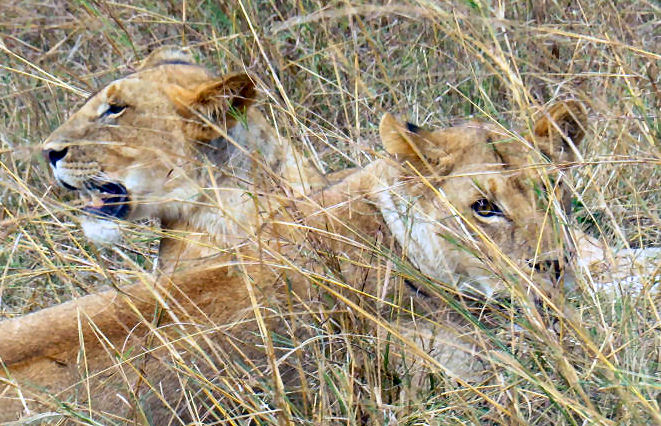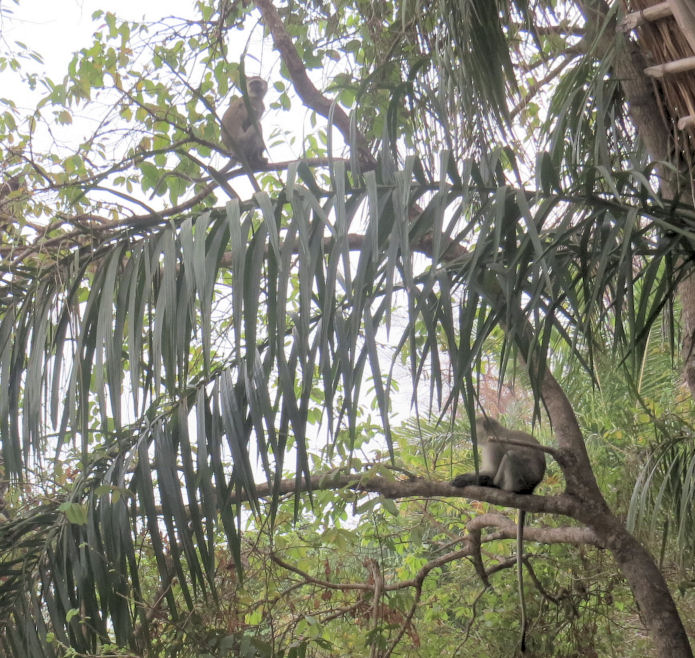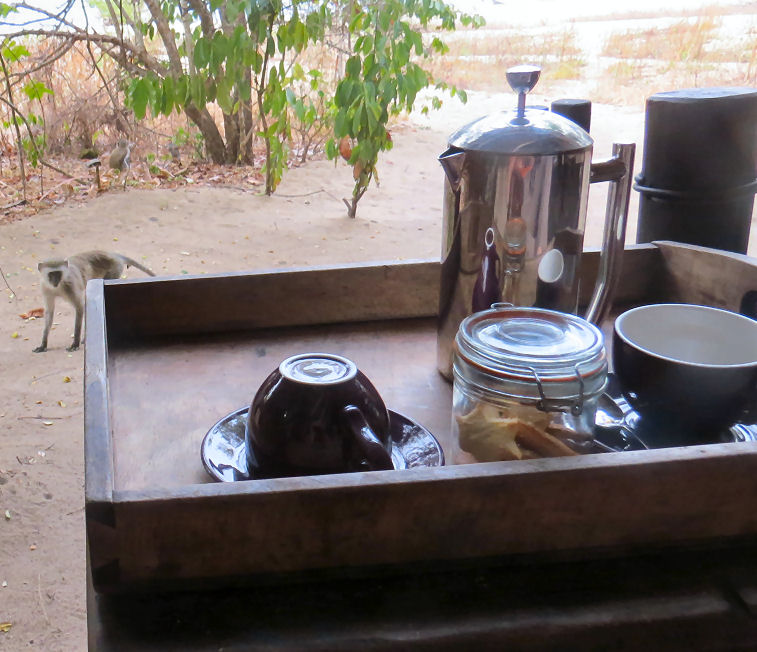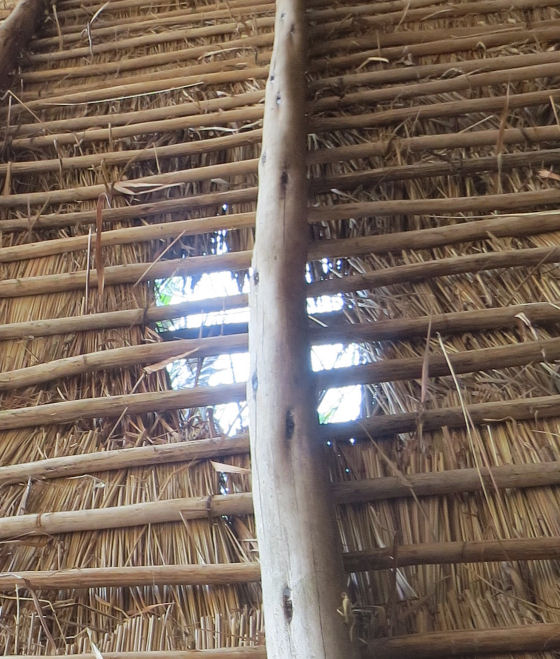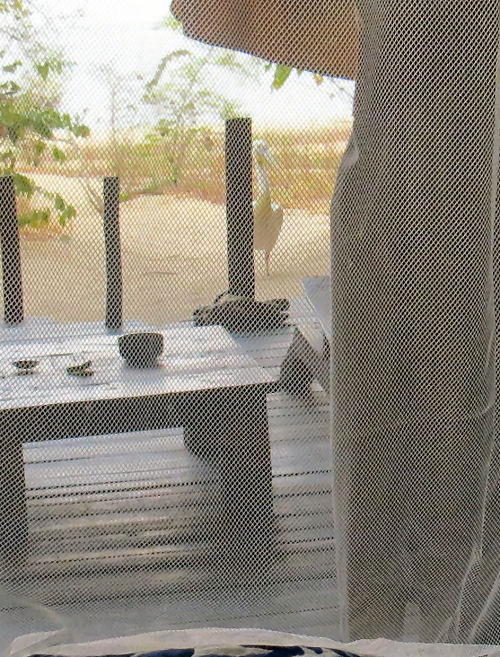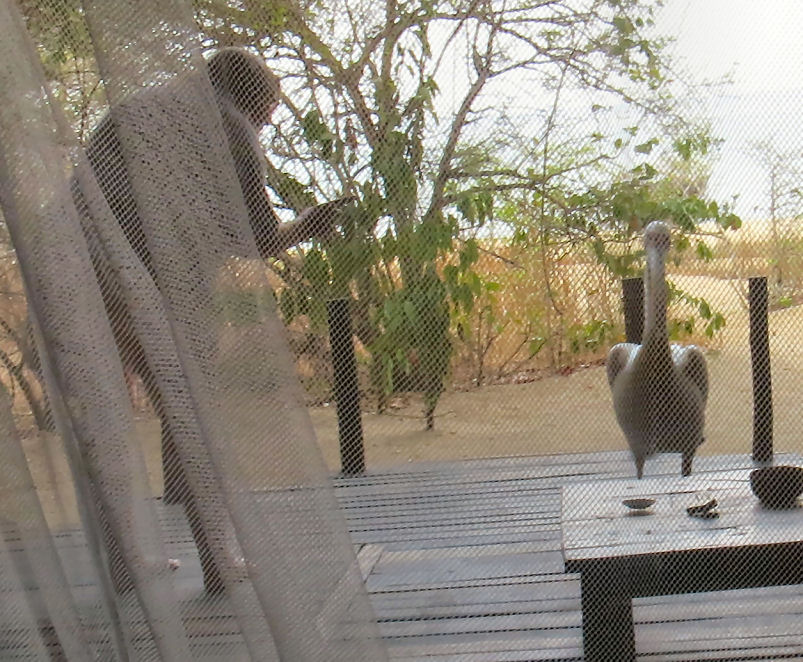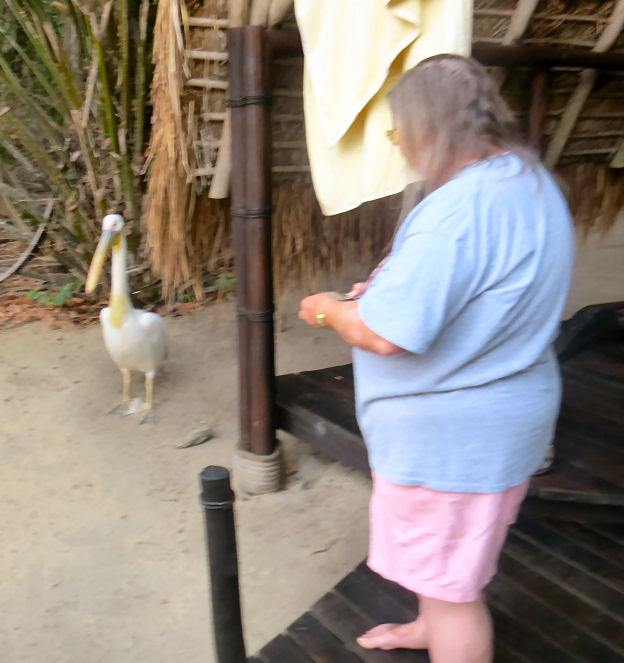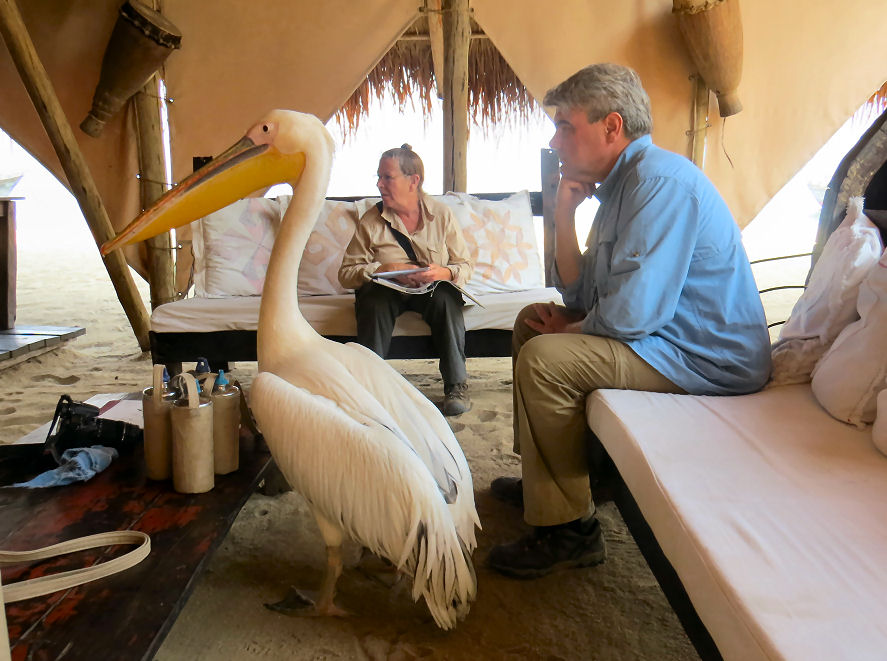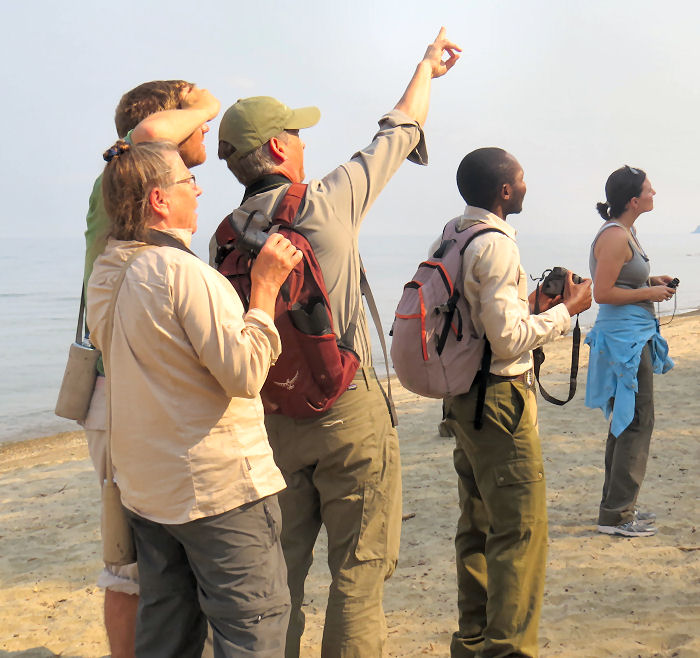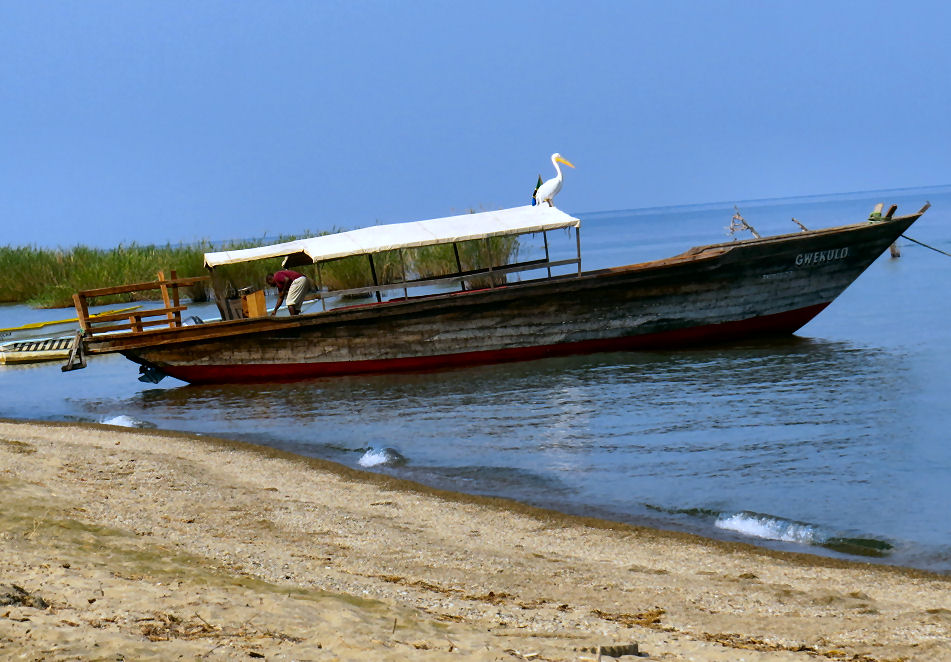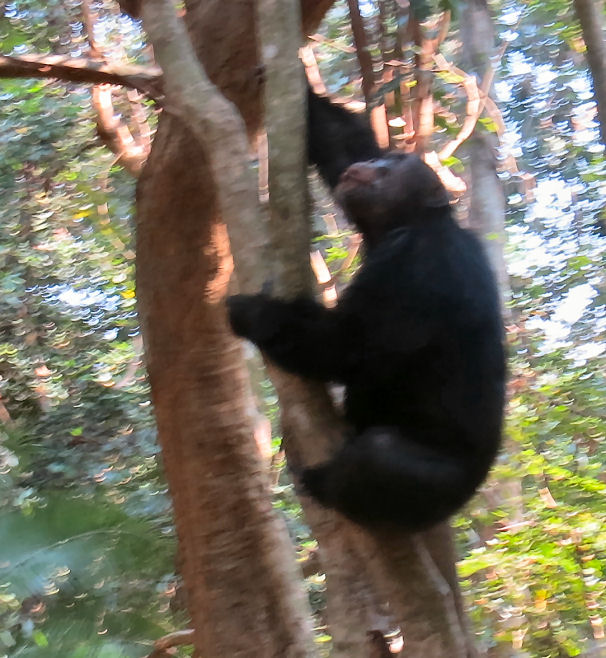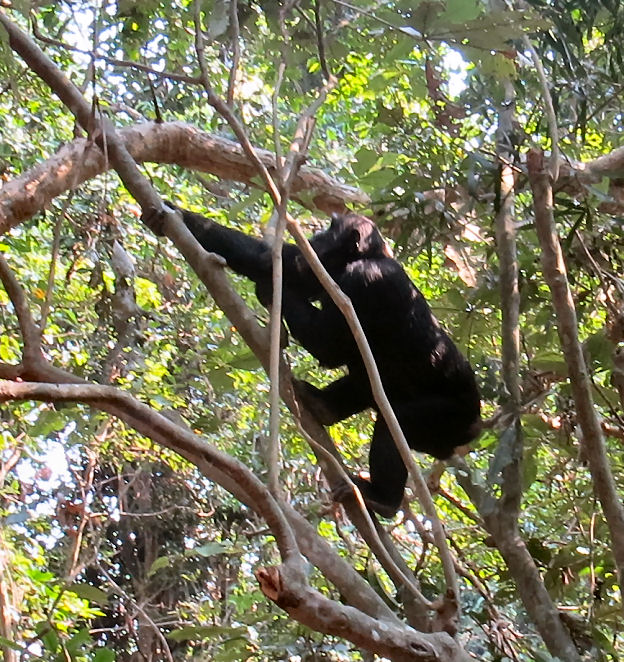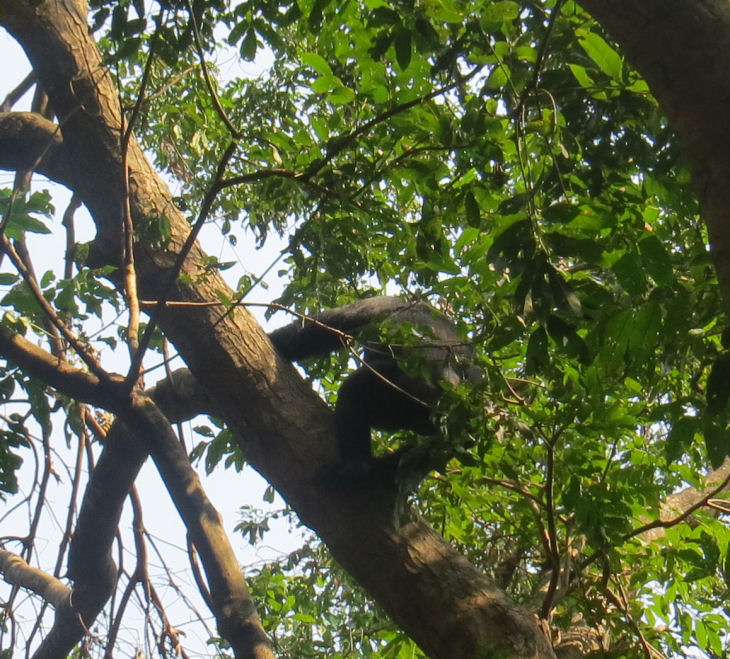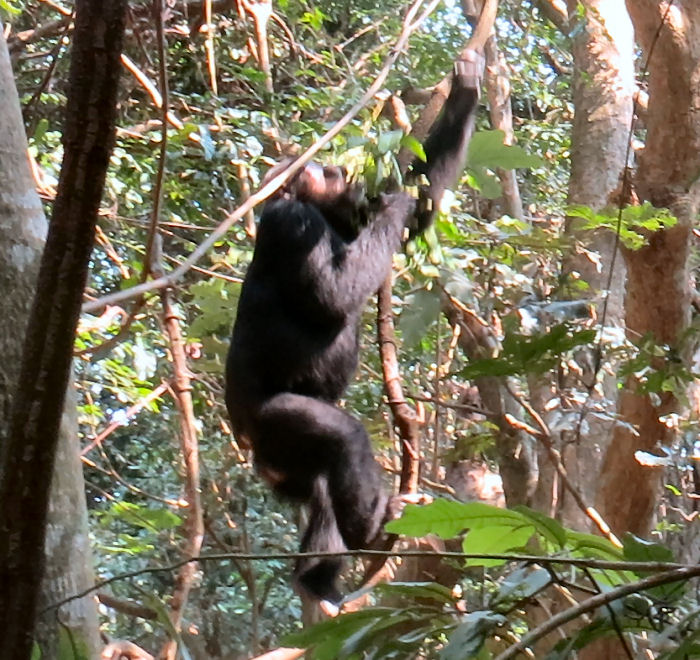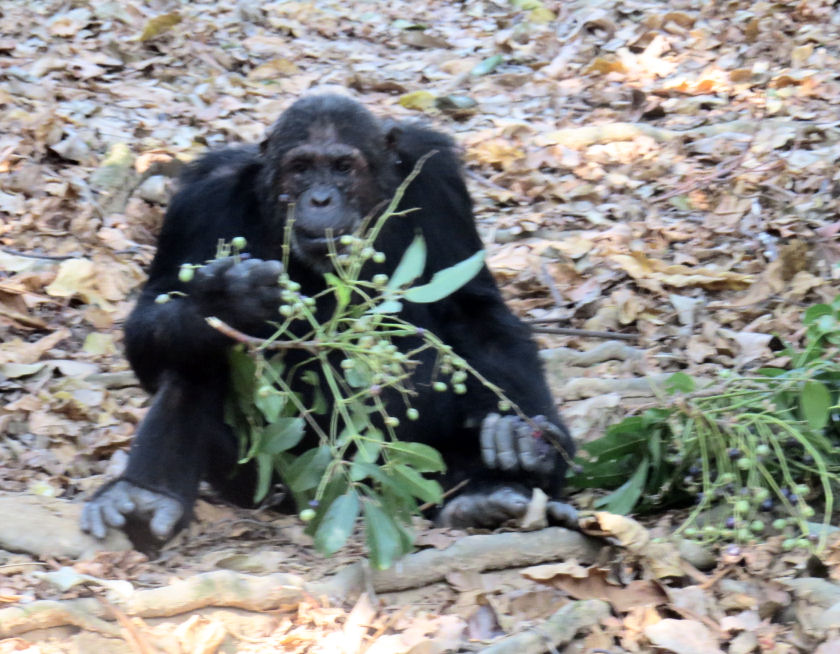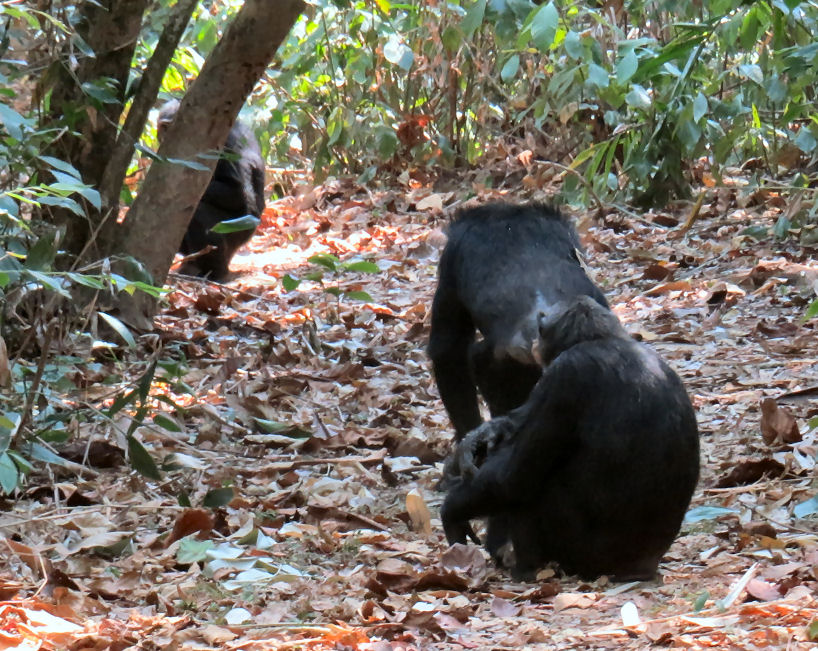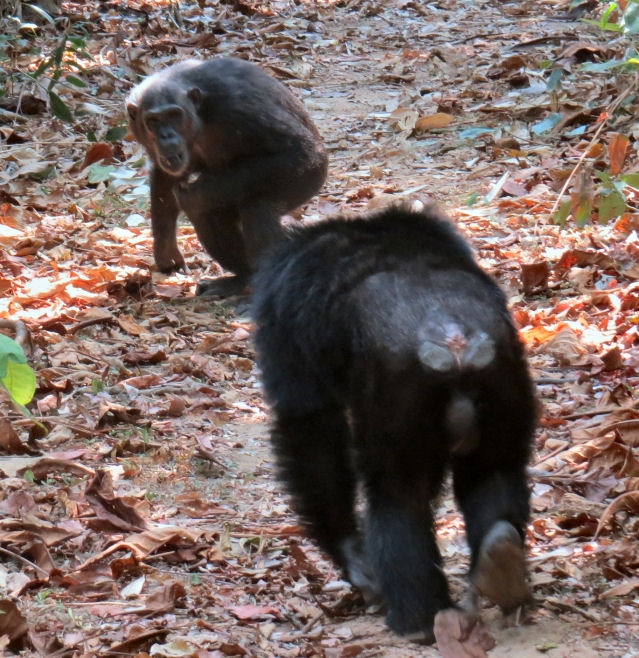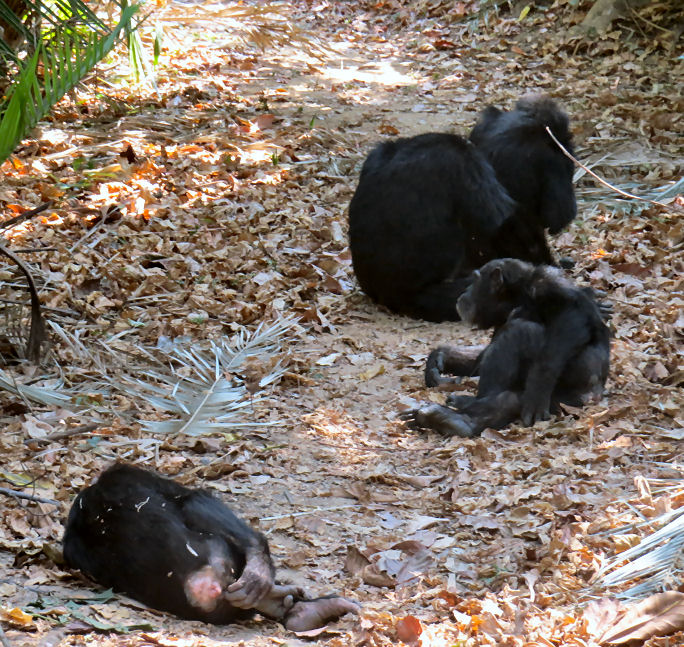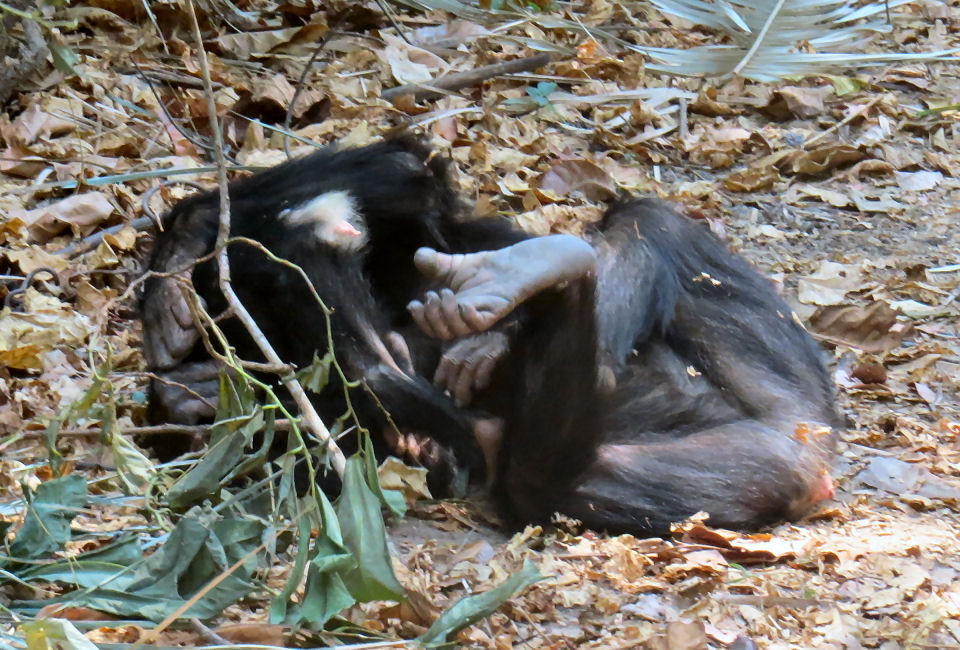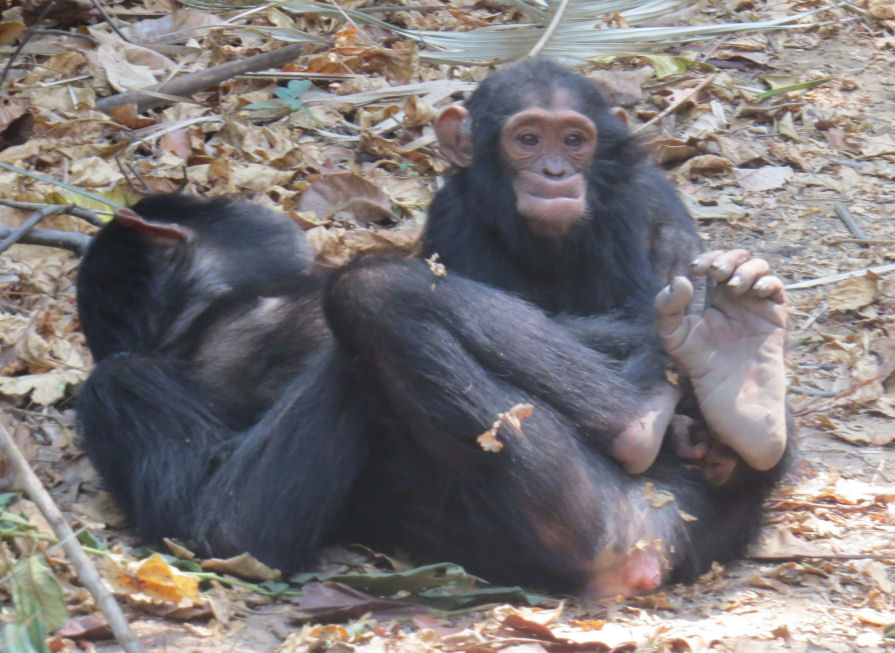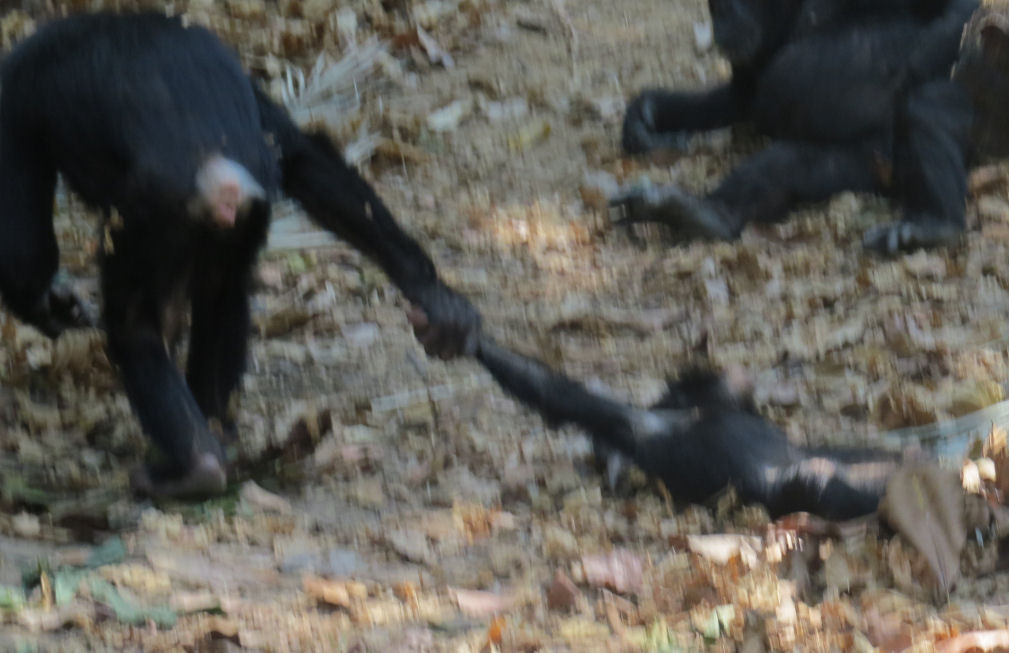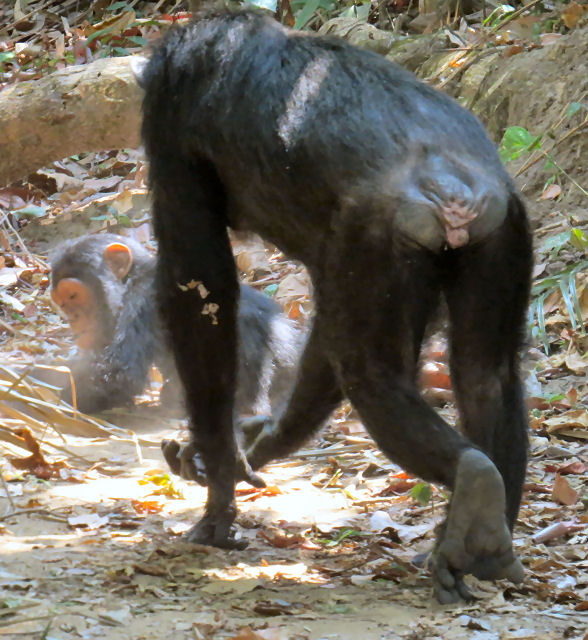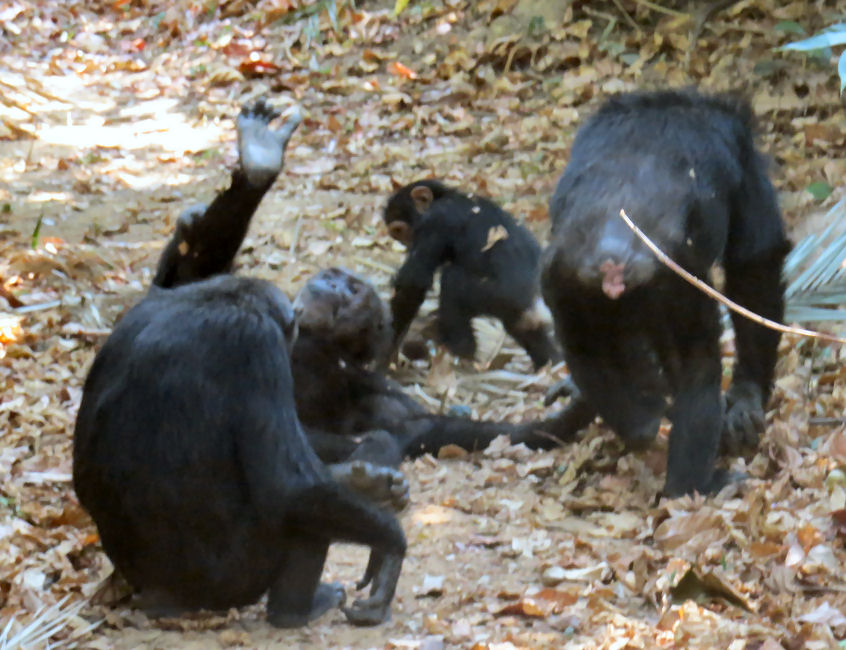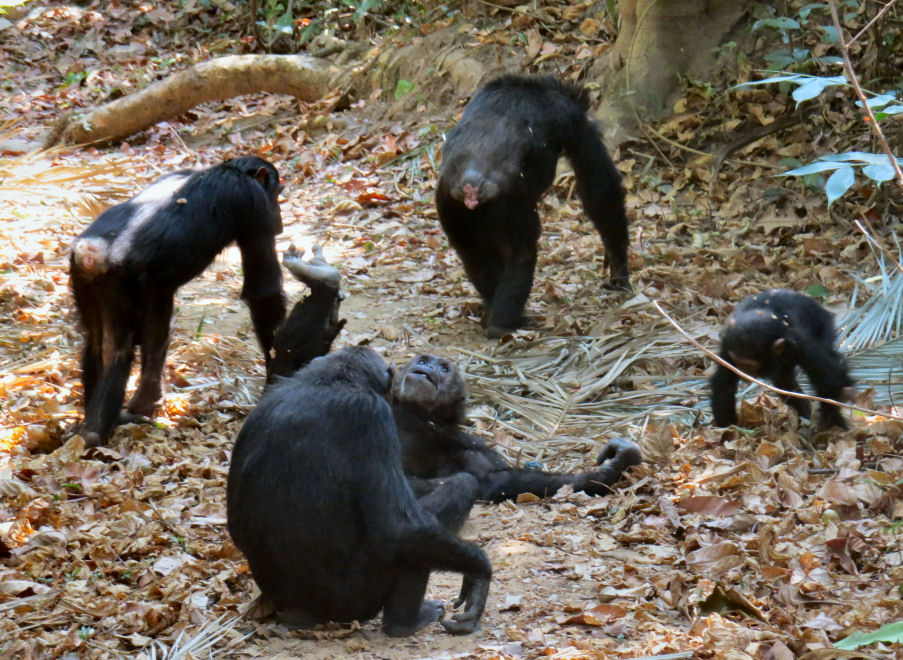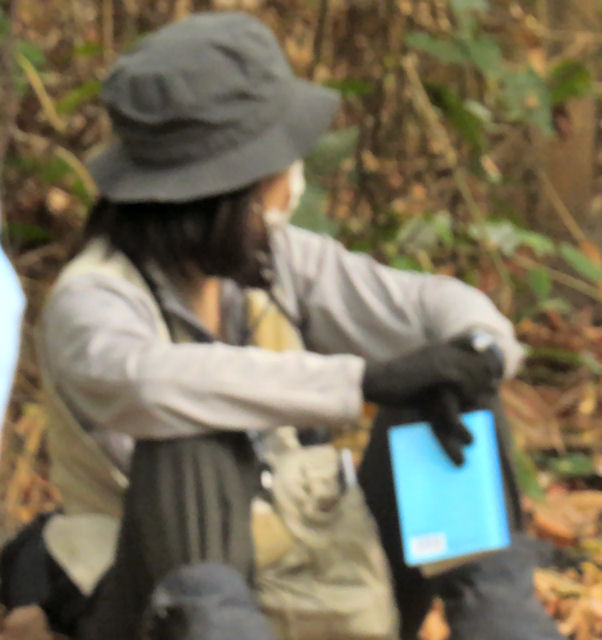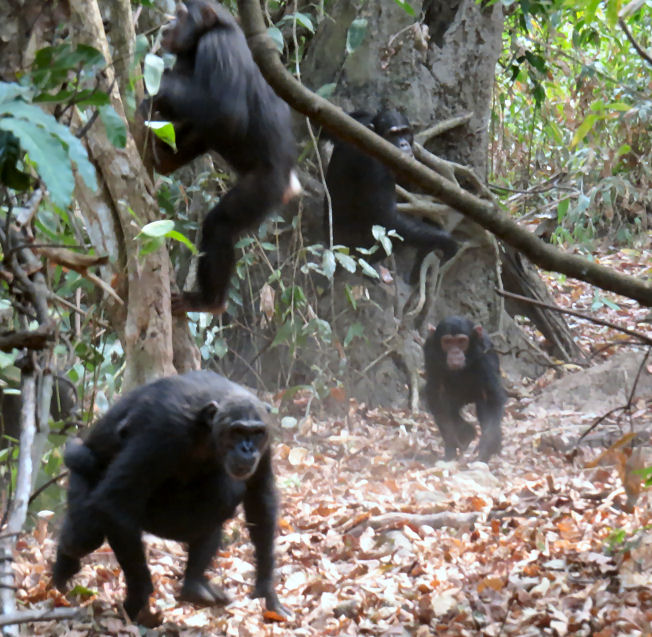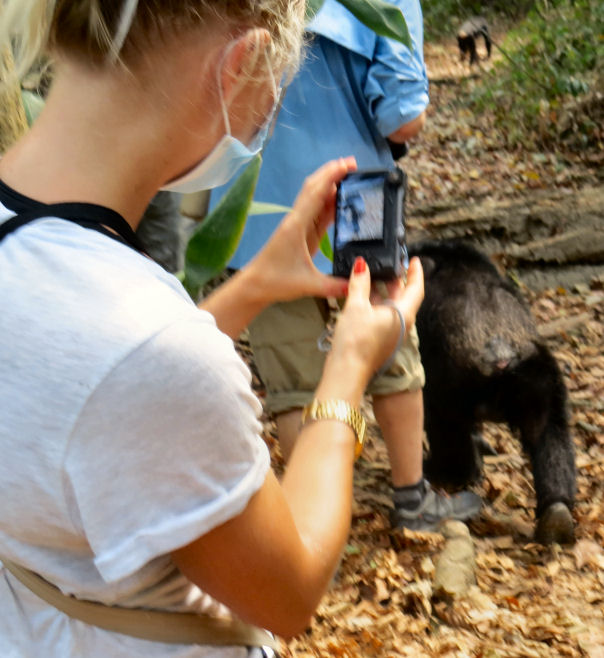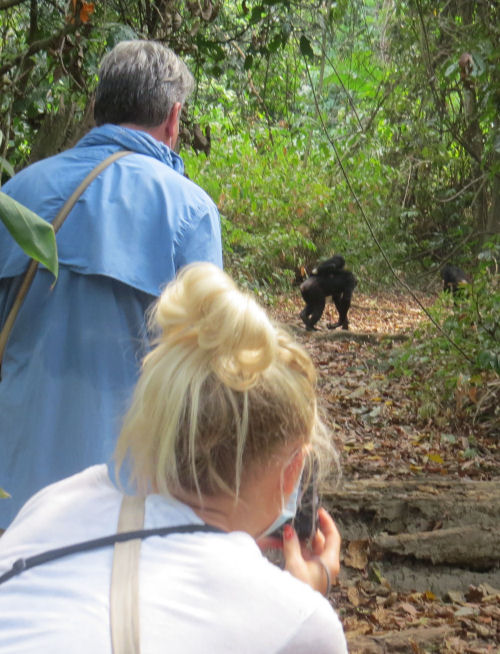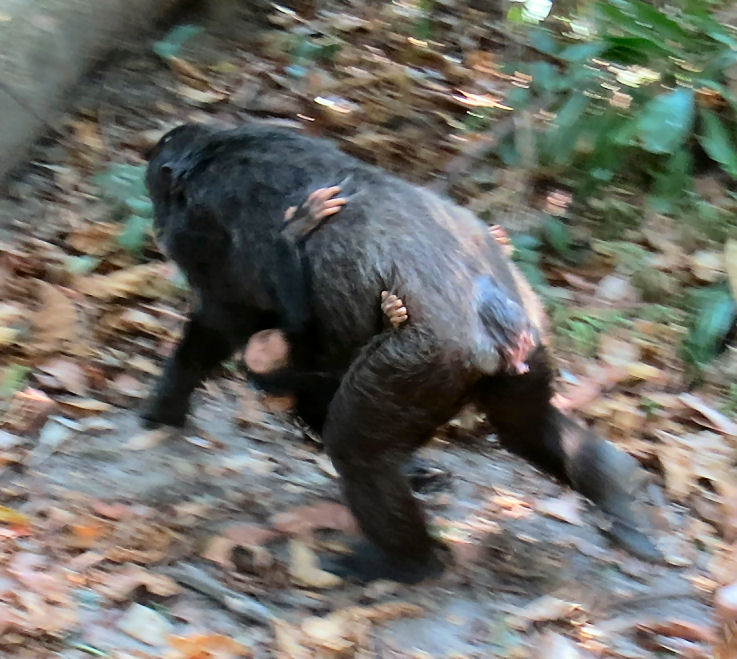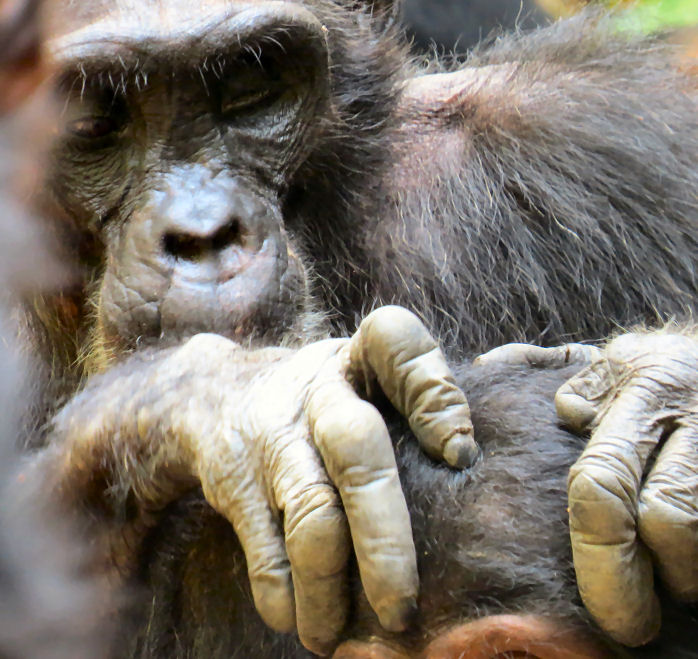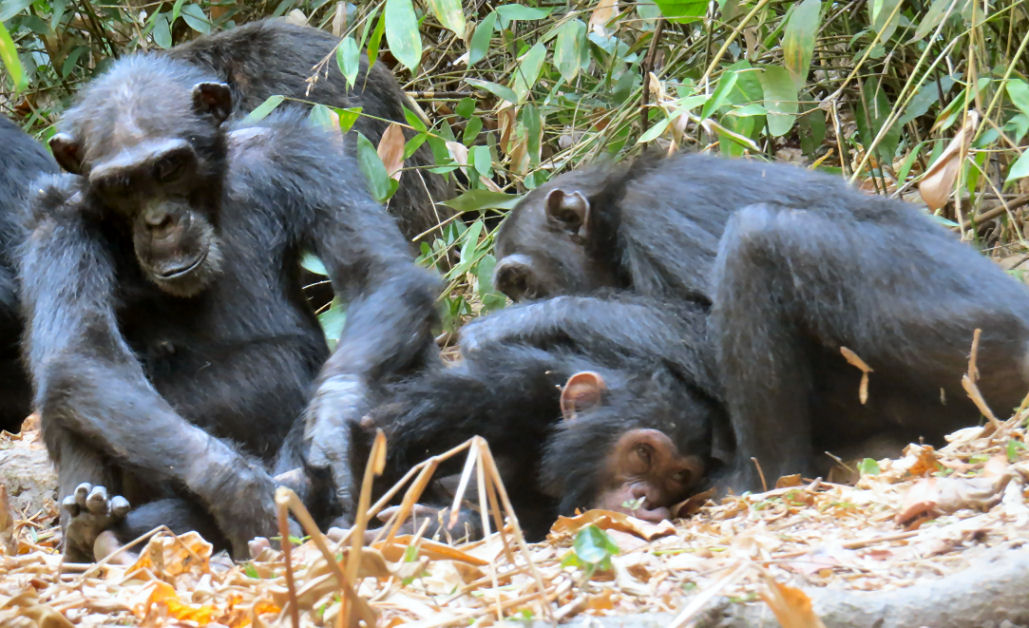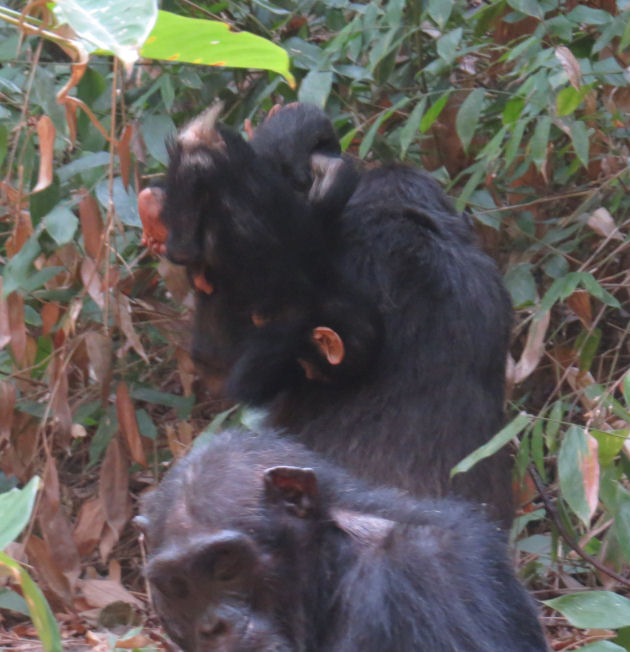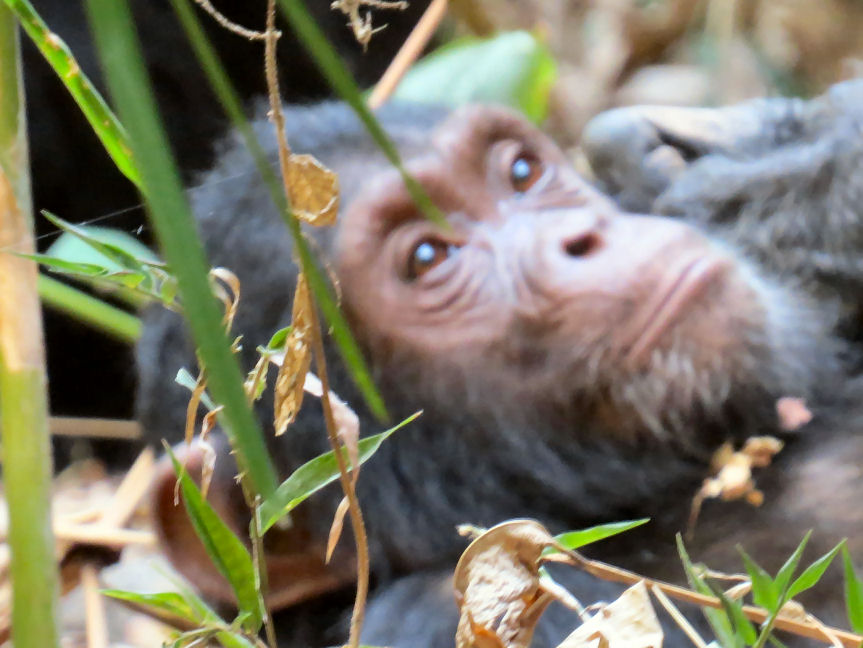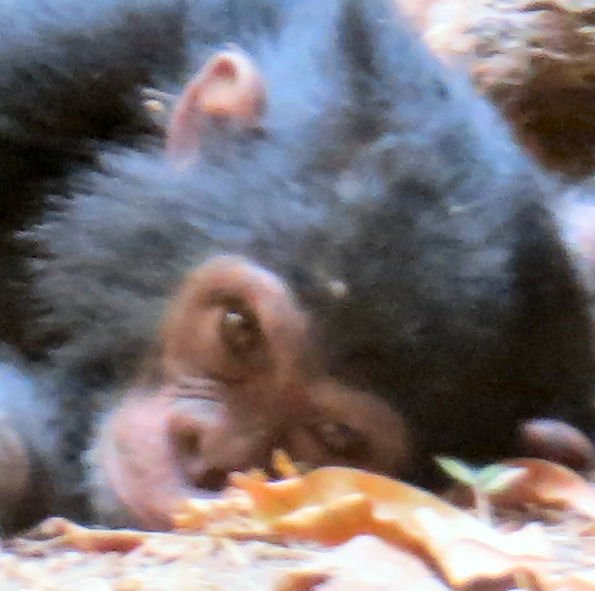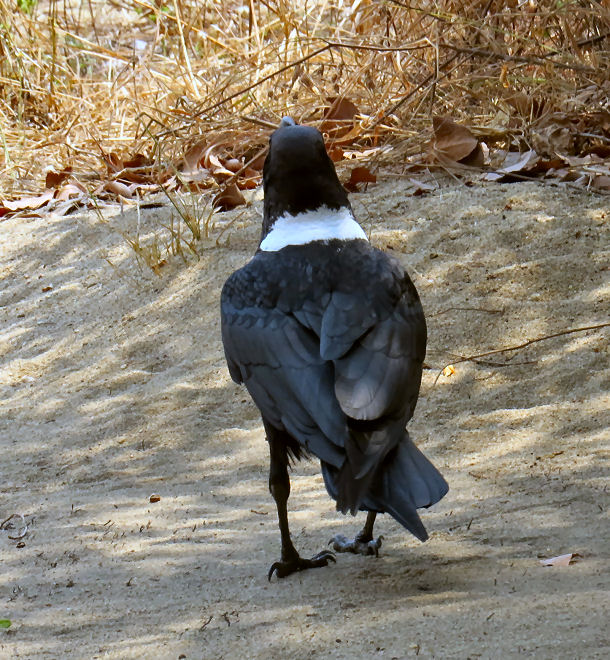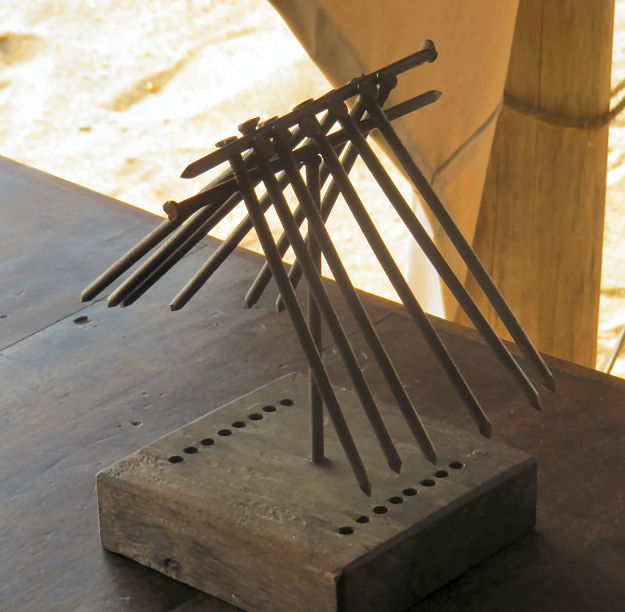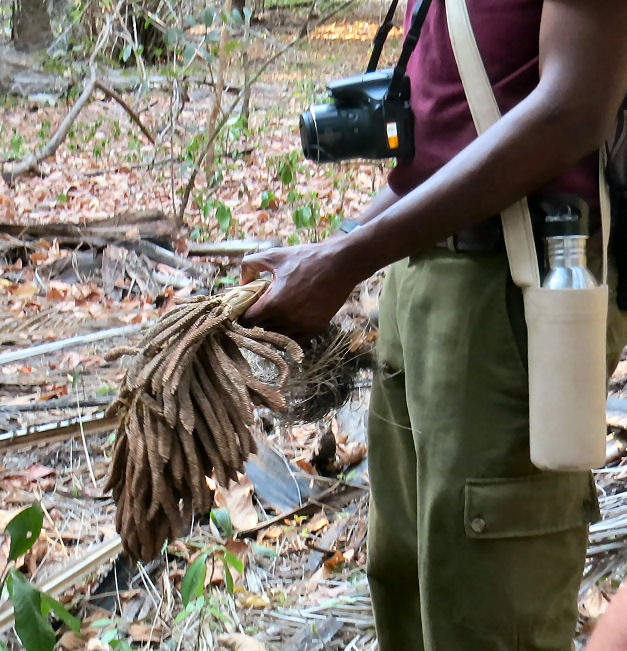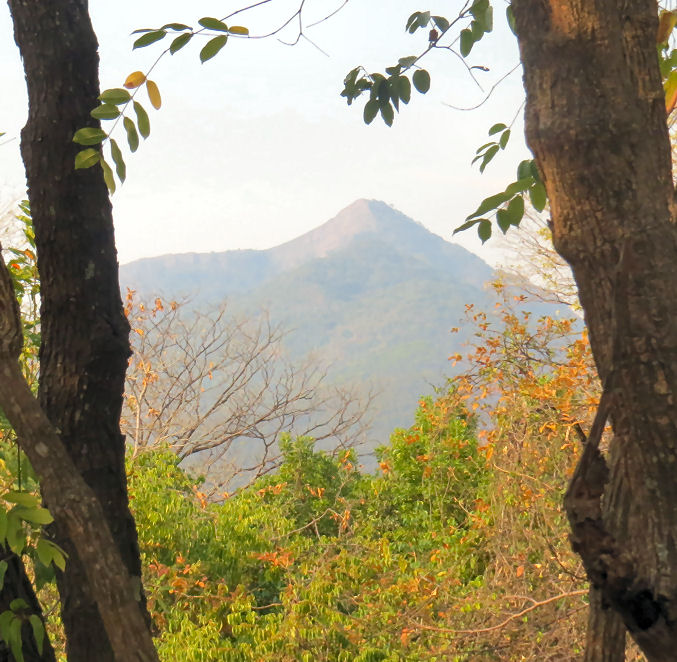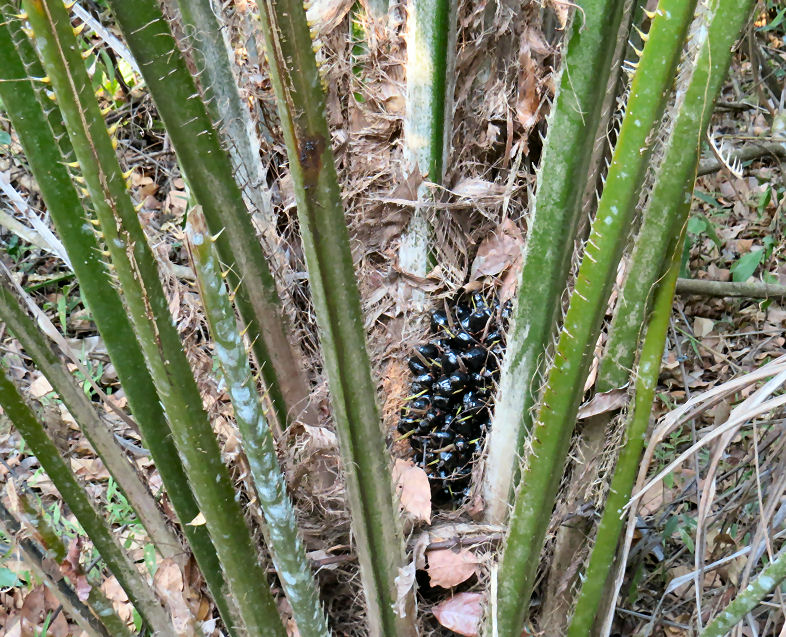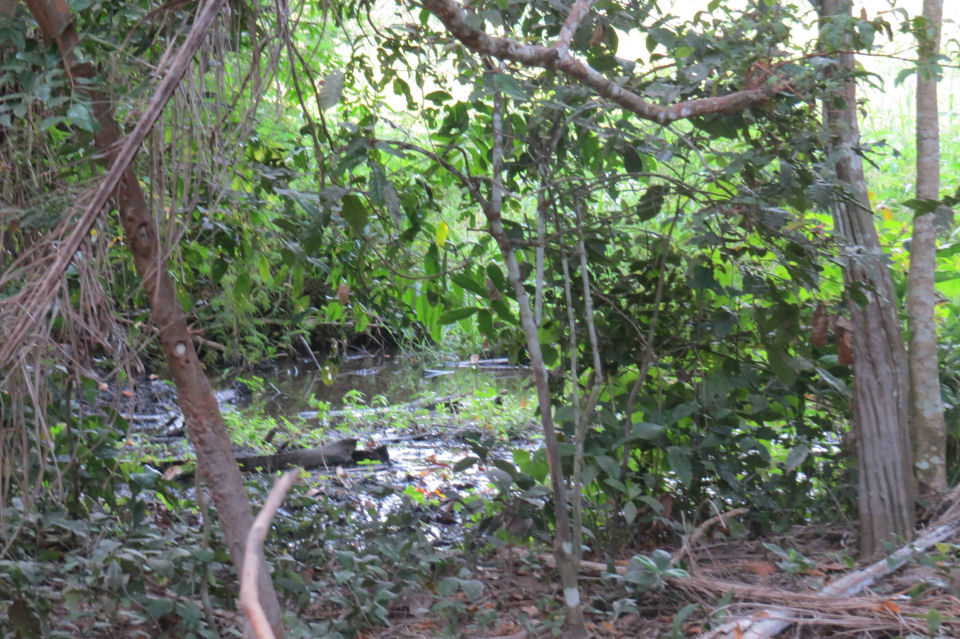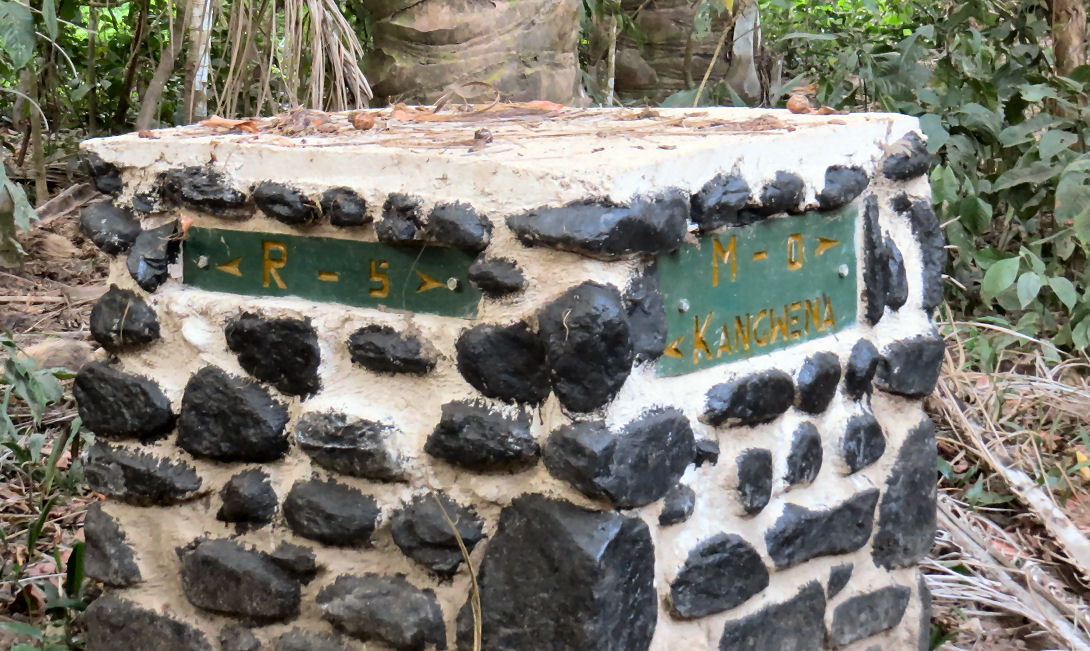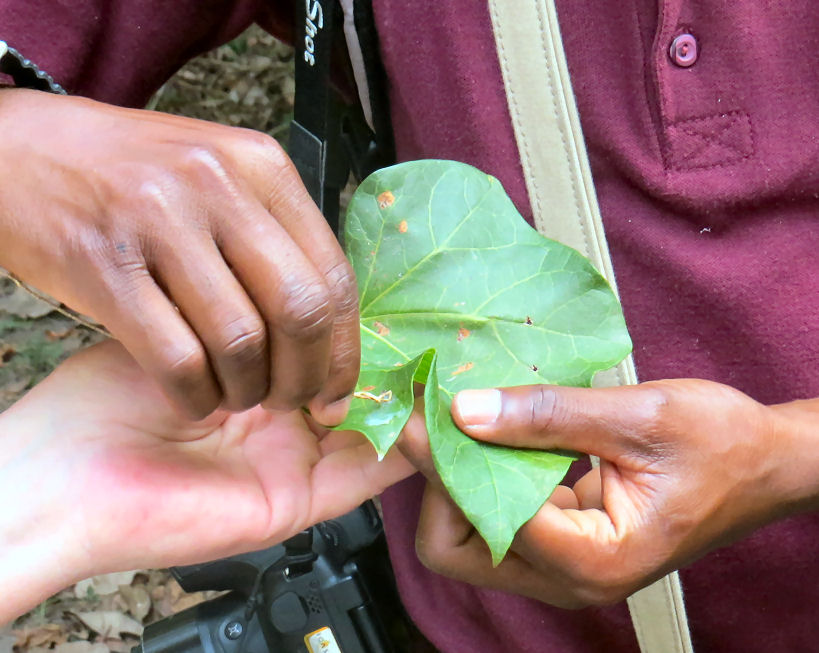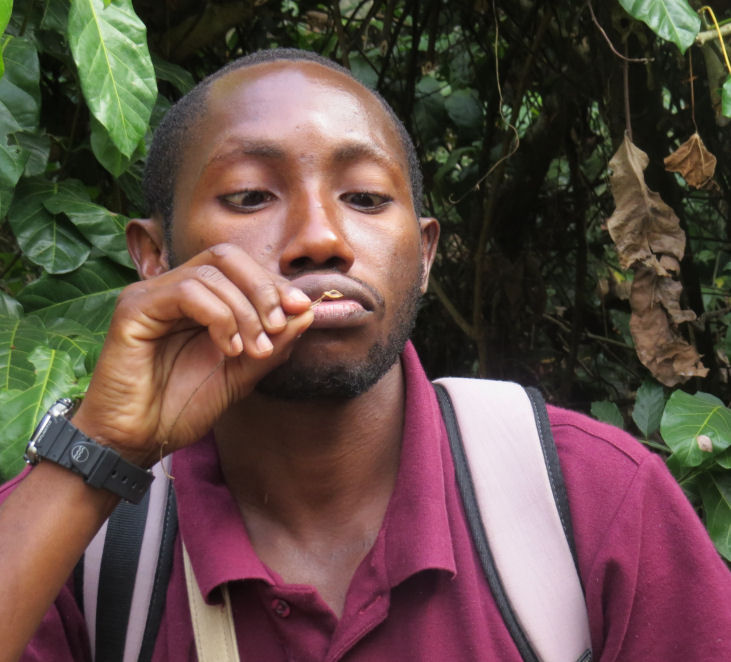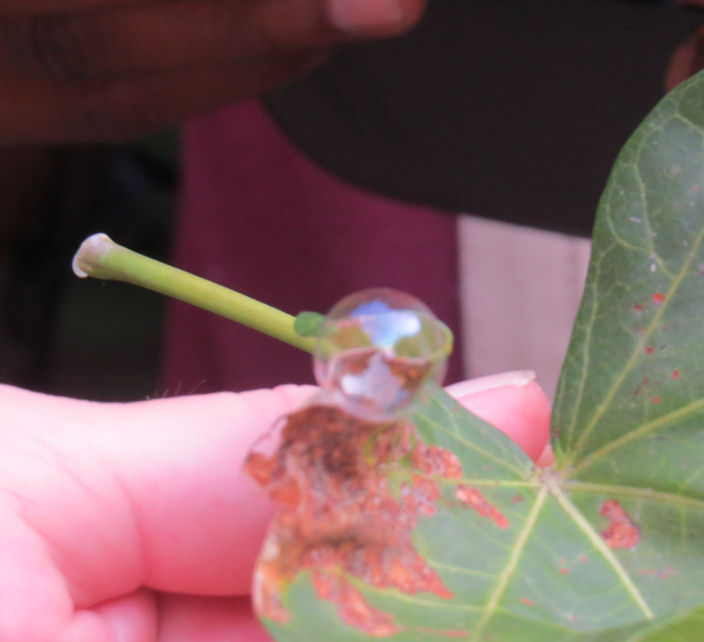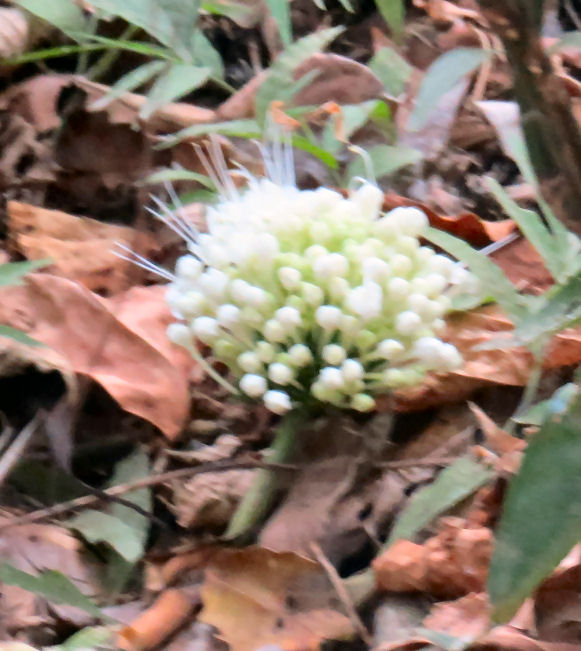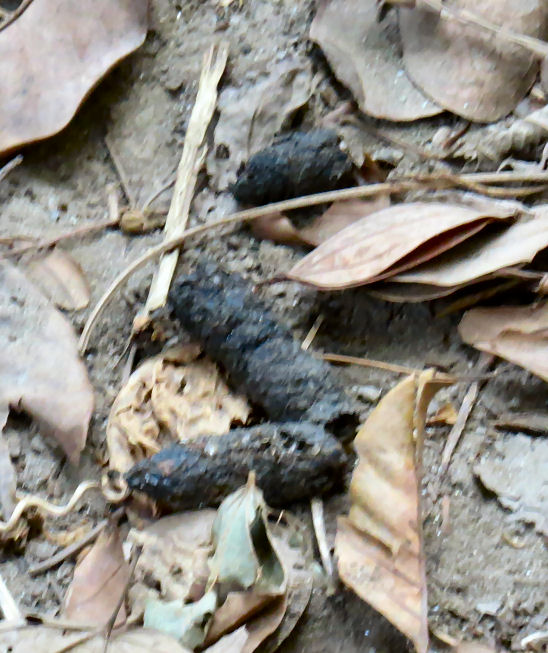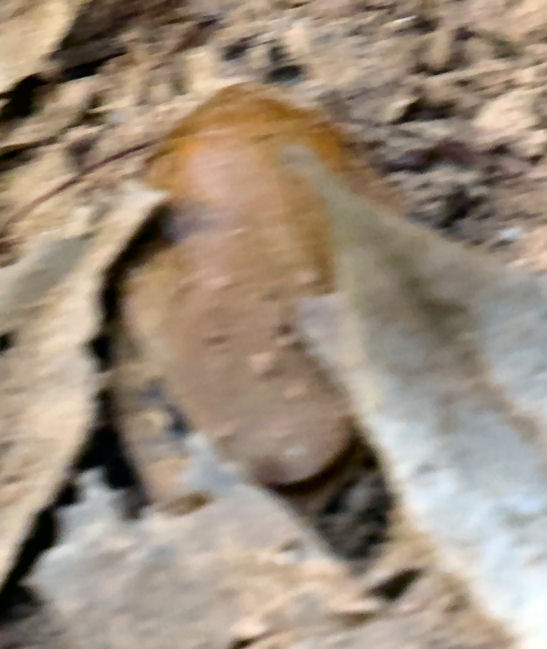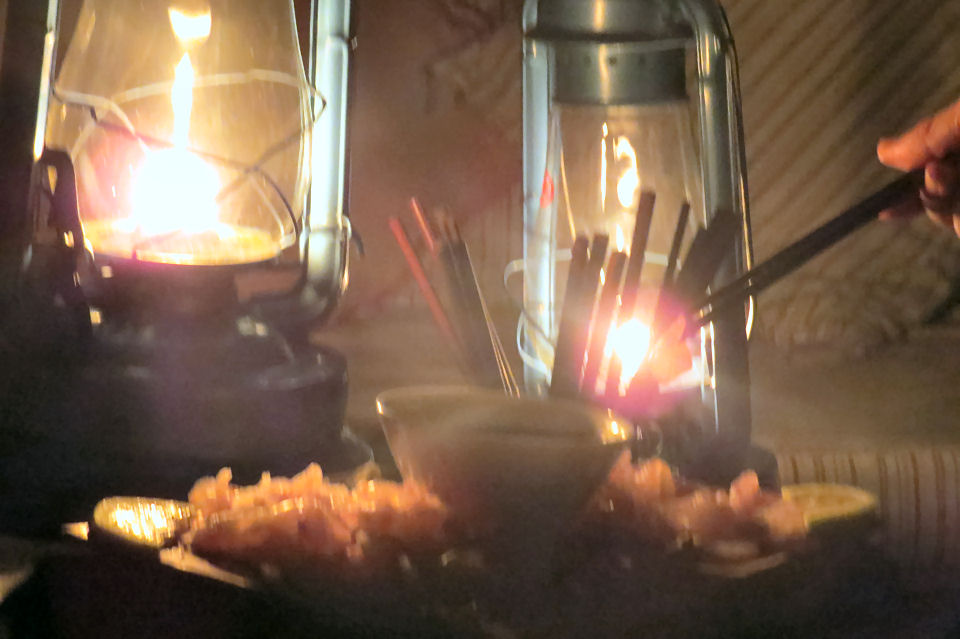Even before breakfast our tent was a hubbub of activity.
I was looking forward to another day viewing the chimpanzees. I had read several accounts of this activity, and no one had described anything as grueling and unrewarding as what we had experienced on Saturday. I was awake, dressed, and feeling chipper when the man with the coffee arrived at about 7. This time he placed the heavy lid on the coffee tray.
The light was dim, but the atmosphere was pleasant. Sue was still sawing logs.I decided to sit out on the deck leading to our bedroom. The low-slug chairs there were, like nearly all the furniture in the banda, made from the remains of nautical vessels.
I was rather surprised to see a vervet monkey with a guilty look on her face and a baby clinging to her chest sitting on the pole about six inches away from the coffee tray. When I approached, she retreated a few feet, but she still watched me very carefully.
I removed the heavy lid and set it aside. I poured myself a cup and let it cool for a minute or so as I hurried to the back room to get my camera. I could not have been gone for more than sixty seconds.
When I returned, the mother and baby were still where I left them, but a different monkey that had previously been watching from a nearby tree was up on the coffee stand with the cookie jar in his hands. He scampered away empty-handed when I approached. If the jar had been a few ounces lighter, we would have lost our cookies. I took a few photos of the mother and her baby.
I had been sitting in the chair on "Sue's side." When she got out of bed, I moved to the one on the other side. These chairs looked very stylish, but they were not comfortable to sit in for more than ten minutes. I also noticed that there was a hole in the thatch roof directly over my chair. I would not want to sit there during a cloudburst or a monkey attack.
The monkeys were not our only uninvited pre-breakfast guest. Big Bird boldly strutted up the path to our banda just as Sue and I were about to go to breakfast. In blatant violation of the rule against setting foot on any of the platforms, he hesitated not even a second in his march right into our banda. He knew just what he wanted, too. He went straight to the package of postcards that were near the foot of the bed.
Cam and Kate had told us that Big Bird hated brooms and that, if he bothered us, behind the banda there was probably a broom that we could use to force him out. I went into the back room to look for it. I could not find it, but I did locate my monopod, which I extended to its full length. I took advantage of a moment during which Big Bird had dropped the postcards to push at him with the monopod. I had to poke him quite a few times to drive him out of the tent. My monopod was equivalent to a broom handle. Evidently it was the handle of the broom that bothered him, not the brushy head.
Big Bird also made an appearance while we were eating breakfast, but he was not too obnoxious in the dining area. I ordered an omelet, and I really enjoyed it.
At breakfast we learned that Scott and Shelly had been visited again by their feline (?) intruder. Scott had gone to great lengths to capture its image with his camera, but he had not been successful. Cam had the equipment to take photos or movies using a motion detector, and he averred that he would try to deploy it near their tent to on the following night.
Once again there was no word from the trackers during the morning meal, but at 9:05 Matius announced that the trackers had located the chimps near the Japanese research station in a spot that was not as remote as Friday's spot. We learned that the chimps build mini-nests for sleeping in the trees every night, and there was no predicting where they might decide to stay from one night to the next.
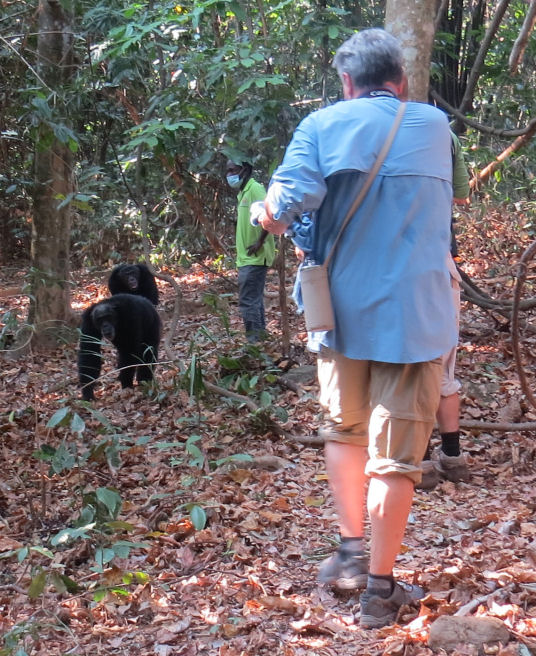
Sue was not interested in another day of bushwhacking, and so she decided to stay home. She picked the wrong day to stay in camp. The viewing was tremendously better on Saturday, and the hiking was not nearly as strenuous. On Friday I took 111 photos of chimps, and, frankly, most of them were boring. In Saturday's viewing session, I snapped 240 shots. The main problem that I faced was that so much was going on in so many directions that it was hard to capture all of the activity. One of the main differences was that the groups that we viewed on Saturday included several females and youngsters.
Kate joined us for the excursion. Her SLR camera and lens were carried over one shoulder with a very long strap. This provoked a session of camera envy among some of the guests.
Our group this time consisted of the four surviving New Englanders and the two Old Englanders, Matt and Hannah. Our guide was Matius. After a short hike we came upon Primus and two other males gamboling about in and around some trees. On our arrival Primus threw a stick underhand in no particular direction. The act seemed assertive more than aggressive. The chimps climbed up and down the trees effortlessly. Some apparently discovered some berries or other delicacies thirty or forty feet up.
One chimp broke off a branch and brought it down to the ground with him so that he could sit down and eat his breakfast in a more civilized manner. He offered to share his repast with neither the other chimps nor the tourists.
We then moved a little ways down the trail and encountered several groups of chimps of all ages and both genders engaged in all kinds of familial interactions. We followed them as they slowly moved down the path. At one point we crossed a lady who was presumably one of the researchers. I surreptitiously took her photo, but it was rather blurry.
Blurriness was the biggest problem that we faced that day. Occasionally a pair or two would stop for an intimate grooming session, but they would often be interrupted by other chimps moving on the path. Something in nearly every photo was in focus, but often it was not the most interesting activity.
At one point something happened involving some males who were crashing through the brush a few feet from the trail. Nothing seemed to come of it, but all of the chimps on the trail panicked and started to climb trees. The mood only lasted for a minute or so.
We learned from Matius and Butati that the Japanese researchers named the chimps. At first they had honored leaders of the local tribe, the Watongwe, by naming chimps after them. When they learned that the honorees considered this process insulting, the researchers switched to English and Japanese names.[1] More recently they began naming young chimps with the same first letter as their mother. Thus, Caesar, the up-and-coming male chimp, was the son of the influential female named Cynthia.
Culling the photos of the viewing session down to a manageable number was a very difficult and time-consuming task. The temptation to include all of the shots of the baby chimp with the big ears was almost overwhelming. It certainly was shocking to watch its mother drag it along the trail by one arm, but the baby seemed not to mind at all.
This time the viewing period ended much too soon. While it was true that by then the chimps were beginning to show signs of postprandial lethargy, it was still a joy to follow them and take as many photos as possible.
Matt enjoyed a quick dip before boarding the dhow. Others may have joined him. I can swim, but the experience does nothing for me. As soon as I emerge from the water I always feel very cold, and I begin to shiver.
Upon our arrival back in camp we saw a white-necked raven.
While the rest of us were chimping, Sue had spent part of the morning swimming in the waters by the camp. In the process she picked up more insect bites. By the time that the rest of us returned they were bothering her quite a bit. She put soap on them, but they still bothered her.
Lunch was roast beef and vegetables. Iced tea was served in very small glasses. Europeans, — and maybe Africans, too — do not seem to consume cold beverages in the massive quantities that is customary in the states. Seldom does one very large glass (perhaps two or three times the size of the glasses in Mahale) of iced tea suffice for me.
During the break I finished the third book of the Glasgow trilogy. I won't reveal the ending, but I did not find it at all satisfying. After that I took an hour-long nap. While I was asleep the intensity of the wind picked up quite a bit.
To Kate's utter astonishment, Tom solved the nail puzzle in record time. He reported that it was missing two nails; if it had been missing only one nail, it would have been impossible. I told anyone who would listen that he was the smartest guy whom I knew. I did not add that I knew some very smart bridge players.
We all already knew that Rodd was an ornithologist. Since he wore a uniform-like shirt with "The Nature Conservancy" emblazoned over the pocket, I assumed that he worked for that organization. I had at some point overheard Amy talk about her work as a physician's assistant specializing in heart surgery. The two of them also had a small winery. They had thought about expanding this undertaking into a serious business, but they decided that, at least for the nonce, it was too daunting.
At tea I learned that Scott worked for a company that constructed very large concrete structures such as stadia and Apple's new headquarters in Cupertino. I think that he said that he was the Quality Control Manager. I also learned that he and Shelly had not been married long. Their last vacation had combined Switzerland and Croatia.
After lunch Butati took the five New Englanders on a nature hike through the area behind the campsite — that is, away from the lake and towards the mountains. This was a low-key and enjoyable experience. My recollection is that everyone else took another boat ride.
The trail was a circle. We went clockwise so that the climbing was at the beginning when we were still fresh.
Butati informed us that the palm trees that were abundant near the camp had both male and female trees. He also told us how to identify the males and females, but I failed to write that down.
Some of the native people ate various common insects. Termites were a favorite. They collected the little critters, removed the wings, and fried them. Some people even ate them raw. Are you snickering? I have heard that some people not raised in Kansas actually eat oysters.
Grasshoppers were considered a delicacy in Tanzania. They were often offered to guests as a special treat. Butati may have recited the recipe, but I missed it.
In the distance we saw one of the mountain peaks. I wrote down "Mt. Mohan Sabandi," but since Dr. Google knew of nothing with this appellation, I probably misheard him or misspelled it. Butati noted that it was a frustrating mountain because climbers repeatedly reached a peak only to see another peak that was higher.
Butati identified a broad-billed roller for us.
He showed us an oil palm. It posed for photos.
Butati saw an African paradise flycatcher. He had his camera (a Canon SX60, which I would have purchased if I had known that it existed) with him, and he photographed it.
He showed us a tree called a clerodendron Schweinfurthi, or something like that, as well as common reedgrass that looked like bamboo and served many of the same functions. It was used for biofuel and fencing, but some of the people also took it for constipation. It was hard for me to believe that anyone in Africa suffered from constipation.
We saw some scat, which Butati said appeared to be from an African palm civet, a small animal that resembled a cat, but it actually had its own genus. We also saw a red-tailed monkey in a tree, but I was unable to get a photo of it.
Butati spotted a red-capped robin-chat.
He then showed us some "African nutmeg," which was used a substitute for real nutmeg. It was unlikely that this humbug would fool the five of us with our strong ties to the Nutmeg State.
Tom startled everyone by finding an insect on the ground. Butati identified it as a cockroach.
From this point on my handwriting was untrustworthy. I can read the word "checkered," but not what comes after it. "Novicefly" seems quite clear, but in the word after it I can only make out the initial "b."
We saw two mocker swallowtails, which are butterflies, mating.
Butati showed us some quartz as we neared the end of the circuit.
I do not remember too much about the reception in the bar that evening. I clearly recall that I continued to help empty the Famous Grouse bottle and that the appetizers were delicious. I also remember that the Californians reported that their fishing expedition had not been successful.
I can recall few details of that evening's supper either. I think that Scott said that he planned to break out his tripod in hopes of photographing their nocturnal intruder, and Betty reported that a fairly large snake was spotted between her tent and ours.
One more day of chimping and a long trip home were all that remained of this spectacular vacation.
[1] Including baseball players. Surely Ichiro the chimp was named after Ichiro Suzuki.
